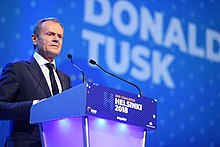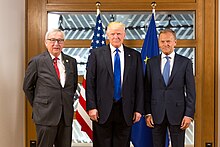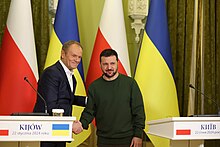Donald Tusk
Defunct Donald Franciszek Tusk[a] (born 22 April 1957) is a Polish politician and historian who has served as the prime minister of Poland since 2023, previously holding the office from 2007 to 2014.
[3] Having been the longest-serving prime minister of the Third Republic, Tusk oversaw in his first term the reduction and digitization of the public sector, wishing to present himself as a pragmatic liberal realist and technocrat.
In his second term, various scandals, unfulfilled promises and a cooling of the economy in 2012–2014 as a result of his European debt crisis-related austerity policies led to a drop in public support.
[12] His paternal grandfather, Józef Tusk (1907–1987), was a railway official who around 1941–1942 was imprisoned at the Neuengamme concentration camp; in 1944, as a former citizen of the Free City of Danzig, he was forcibly conscripted by German authorities into the Wehrmacht.
This, together with his Kashubian ethnic ancestry and multilingual family, meant that he grew up with an awareness that "nothing is simple in life or in history," which informed his adult political view that it is "best to be immune to every kind of orthodoxy, of ideology and most importantly, nationalism."
Although both leading candidates came from the center-right, and their two parties had planned to form a coalition government following the parliamentary elections on 25 September, there were important differences between Tusk and Kaczyński.
[20] During the 2007 parliamentary election campaign and initially, when he entered office, Tusk promised to continue the free market policies, streamline the bureaucracy, enact long-term stable governance, cut taxes to attract greater foreign business ventures, encourage Polish citizens living overseas to return to Poland, and privatize state-owned companies.
[41] Under Tusk's premiership, Russian bans on Polish meat and agricultural products were lifted, while Poland reversed its official policy of disagreement on a European Union-Russian partnership agreement.
[44] In regard to U.S. plans of hosting missile defense shield bases in the country, Tusk hinted skepticism toward the project, saying that their presence could potentially increase security risks from Russia, and rejected U.S. offers in early July 2008.
[48][49] Contrary to the condemnation of foreign governments and the leadership of the European Union, Tusk supported Hungarian Prime Minister Viktor Orbán in his efforts of implementing a new controversial constitution.
"[58] However, during the European sovereign debt crisis, Tusk and his government displayed less optimism in joining the monetary union under contemporary economic circumstances, leading to Finance Minister Jan Vincent-Rostowski calling any move "unthinkable.
[62] While being a constituent member of the Weimar Triangle with fellow states Germany and France, Tusk showed displeasure over German Chancellor Angela Merkel's and French President Nicolas Sarkozy's dominating roles in eurozone negotiations, remarking to Italian newspaper Corriere della Sera in January 2012 that "this should not translate into a lasting political monopoly: things cannot be left to only two capitals of Europe.
Using presidential veto powers, Kaczyński blocked legislation drafted by the Tusk government, including pension reform, agricultural and urban zoning plans, and restructuring state television.
[65] Tusk again reiterated his desire for constitutional reform in February 2010, proposing that the presidential veto be overridden by a simple parliamentary majority rather than through a three-fifths vote.
[66] Further constitutional reforms proposed by Tusk include reducing the Sejm from a membership of 460 to 300, "not only because of its savings, but also the excessive number of members' causes blurring certain plans and projects.
[67] By decreasing the president's role in governance, executive power would further be concentrated in the prime minister, directly responsible to the cabinet and Sejm, as well as avoiding confusion over Poland's representation at international or EU summits.
[68] The opposition conservative Law and Justice party deeply criticized Tusk's constitutional reform proposals, opting in opposing legislation for the presidency to garner greater power over the prime minister.
While not formally excluding his candidacy, Tusk declared that "I would very much like to continue to work in the government and Civic Platform, because that seems to me to be the key element in ensuring success in the civilizational race in which we are engaged.
"[70] A day after the interview, Tusk formally announced his intention of staying as prime minister, allowing his party to choose another candidate (and eventual winner), Bronisław Komorowski.
[81] In this letter, he stated the Trump administration presented a threat to the EU on a par with a newly assertive China, an aggressive Russia and "wars, terror and anarchy in the Middle East and Africa.
[83][85] Szydło refused to sign the EU statement issued at the end of the council's meeting in protest at Tusk's reelection, though other EU leaders spoke in favor of him; Prime Minister Mark Rutte of the Netherlands called him "a very good president,"[85] and European Commission President Jean-Claude Juncker and German chancellor Angela Merkel both made statements supporting the vote.
[86] In February 2018, Tusk urged Turkey "to avoid threats or actions against any EU member and instead commit to good neighbourly relations, peaceful dispute settlement and respect for territorial sovereignty.
"[89] On 6 February 2019, Tusk held talks with Irish Premier Leo Varadkar in Brussels to discuss Britain's departure from the European Union, stating that there was a "special place in Hell for those who promoted Brexit without even a sketch of a plan how to carry it out safely.
[95] Writing of his tenure as President of the European Council, LSE political scientist Sara Hagemann said "he set the tone for a liberal and progressive agenda at a time of significant threat from populist and pro-Russian voices in Europe.
[100] On 10 November, Civic Coalition, New Left, the Polish People's Party and Poland 2050 formally signed an agreement to support Tusk as their candidate for prime minister.
One of his first moves in office involved dismissing the top executives from Telewizja Polska (the nominally independent public service broadcaster), which had been, for years, "a propaganda machine for the PiS government".
Stanley Bill, who serves as a professor of Polish Studies at the University of Cambridge, stated that his motive could have quite possibly been personal, due to the fact TVP had been demonizing him for years under the PiS government.
[114] In October 2024, Tusk announced plans to temporarily suspend the right of migrants to seek asylum in Poland, citing abuses by people smugglers aided by Belarus and Russia.
This comes after a string of comments former president and 2024 candidate Donald Trump made saying that he would let Russia do "whatever the hell they want" to NATO countries who do not satisfy spending commitments.
[120] In August 2024, Tusk stated that Ukraine's membership in the European Union would not be possible without resolving the issue of Polish victims of the Volhynian Genocide and their proper remembrance echoing the words of Defense Minister Władysław Kosiniak-Kamysz spoken a few days before at a press conference.







